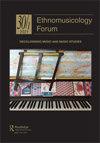African musics in Europe
IF 0.2
1区 艺术学
0 MUSIC
引用次数: 0
Abstract
For centuries, close and multifaceted connections between Europe and Africa have been articulated through imperialism and colonisation, economic and cultural exchanges, decolonisation processes and postcolonial heritage, and have been determined by the conditions of the diverse regions involved, resulting in the complex entanglements of the present global era. These connections have been marked by unbalanced power relations and economic asymmetries, as well as by ambiguous relationships of fascination and the construction and negotiation of Otherness based on race, ethnicity, religion, cultural traits, and social norms. Over the past decades, a rich literature in the field of postcolonial studies has tackled various aspects of the relations between Europe and Africa (and the former colonised world at large) and reflected critically on the long-lasting and everexpanding impact of colonialism. Such scholarship has revealed the inhumanity, violence, and racism of this oppression, and how its consequences have permeated almost every aspect of social, cultural, and artistic life, but has also brought to light forms of agency, strategies of resilience, spaces for negotiation, and acts of rebellion (Baaz 2001; Bhabha 1994; Gilroy 1993; Loomba 2005; Mamdani 1996; Mudimbe 1988; Said 1978). Music and other performing arts have played a significant role in intercultural relations by participating in imaginaries about those conceptualised as Others and have usually corroborated stereotypes of Otherness. This seems to be especially true for African musics and dances, whose repertoires, practices, instruments, and aesthetics have been imagined and perceived by the European hegemonic episteme in terms of sonic alterity and visual difference, representing the exotic, and embodying the ancestral, traditional, and untamed (Agawu 2003; Carl 2011; Castaldi 2006; Gilroy 1993). For the European gaze, the Otherness of African musics is often strictly tied to Blackness as both a visual and auditory feature, although, unlike for example North America, the racial element normally remains unstated by audiences, scholars, and performers (Radano and Bohlman 2000; Rastas and Seye 2016). From pre-colonial visual depictions and verbal descriptions in travellers’ accounts to colonial field recordings, from postcolonial commodification of African repertoires and genres in the world music global market to their massification as an exotic accompaniment, thick imaginings of Otherness have tinged African performative practices. Inequalities in power have meant that Africa and Europe are differently able to express their ideas, shape representations, and influence imaginaries of Otherness and sameness. European-derived representations of African performative practices and aesthetics欧洲的非洲音乐
几个世纪以来,欧洲和非洲之间的密切和多方面联系一直通过帝国主义和殖民主义、经济和文化交流、非殖民化进程和后殖民遗产来表达,并由所涉及的不同地区的条件决定,导致了当今全球时代的复杂纠葛。这些联系的特点是不平衡的权力关系和经济不对称,以及基于种族、族裔、宗教、文化特征和社会规范的模糊的迷恋关系和对“他者”的构建和协商。在过去的几十年里,后殖民研究领域的丰富文献探讨了欧洲和非洲(以及整个前殖民世界)之间关系的各个方面,并批判性地反思了殖民主义的长期和不断扩大的影响。这种学术揭示了这种压迫的不人道、暴力和种族主义,以及其后果如何渗透到社会、文化和艺术生活的几乎每一个方面,但也揭示了代理形式、恢复力战略、谈判空间和叛乱行为(Baaz 2001;Bhabha 1994;Gilroy 1993;Loomba 2005;Mamdani 1996;Mudimbe 1988;Said 1978)。音乐和其他表演艺术在跨文化关系中发挥了重要作用,参与了对那些被概念化为“他人”的人的想象,通常证实了对“他者”的刻板印象。非洲音乐和舞蹈似乎尤其如此,欧洲霸权认知者在声音交替和视觉差异方面对其曲目、实践、乐器和美学进行了想象和感知,代表了异国情调,体现了祖先、传统和未驯服(Agawau 2003;卡尔2011;卡斯塔尔迪2006;吉尔罗伊1993)。对于欧洲人来说,非洲音乐的另类性通常与黑人作为视觉和听觉特征密切相关,尽管与北美不同,观众、学者和表演者通常没有说明种族因素(Radano和Bohlman,2000年;Rastas和Seye,2016年)。从旅行者叙述中的殖民前视觉描绘和言语描述到殖民地现场录音,从世界音乐全球市场上非洲曲目和流派的后殖民商品化,到它们作为异国伴奏的大众化,对“他者”的浓厚想象为非洲的表演实践增添了色彩。权力的不平等意味着非洲和欧洲能够以不同的方式表达他们的想法、塑造表征,并影响对“另类”和“相同”的想象。欧洲对非洲表演实践和美学的演绎
本文章由计算机程序翻译,如有差异,请以英文原文为准。
求助全文
约1分钟内获得全文
求助全文
来源期刊

Ethnomusicology Forum
MUSIC-
CiteScore
1.10
自引率
25.00%
发文量
29
期刊介绍:
Articles often emphasise first-hand, sustained engagement with people as music makers, taking the form of ethnographic writing following one or more periods of fieldwork. Typically, ethnographies aim for a broad assessment of the processes and contexts through and within which music is imagined, discussed and made. Ethnography may be synthesised with a variety of analytical, historical and other methodologies, often entering into dialogue with other disciplinary areas such as music psychology, music education, historical musicology, performance studies, critical theory, dance, folklore and linguistics. The field is therefore characterised by its breadth in theory and method, its interdisciplinary nature and its global perspective.
 求助内容:
求助内容: 应助结果提醒方式:
应助结果提醒方式:


